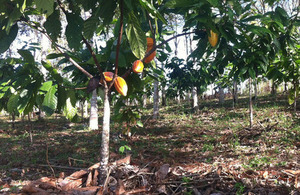Low carbon agriculture and avoided deforestation in Brazil
How the International Climate Fund (ICF) is supporting small and medium-scale farmers to deploy low carbon agriculture to protect and restore forests.

A £24.9m project to develop and implement forest restoration and low carbon agriculture in Brazil is being funded under a grant from the Department for Environment, Food and Rural Affairs. The project will reduce deforestation from agriculture and increase forest and land restoration. This will lead to reduced greenhouse gas emissions, improved livelihoods and reduced poverty, and will preserve biodiversity.
Brazil is home to 12% of the world’s forest area, 35% of the world’s tropical rainforests, an eighth of its freshwater and up to 20% of its biodiversity. These forests support a significant proportion of land-based biodiversity, are substantial carbon stores, and support the livelihoods of people living in rural areas.
Brazil currently ranks as one of the world’s largest greenhouse gas emitters, with around half of all emissions coming from deforestation. Deforestation in Brazil - largely driven by agricultural production - has slowed in recent years, but small scale deforestation remains persistent.
This project is one of many under the International Climate Fund (ICF) in which the UK and partners are tackling climate change, deforestation and poverty.
Participating small and medium-scale farmers in the Amazon and Atlantic Forest will be financially and technically supported to adopt low carbon practices. These include integrated crop-livestock-forestry systems, forest management and recovery of degraded land. This way the project will support delivery of the objectives of the Brazilian Low Carbon Agriculture Plan (Plano ABC) as well as compliance with the Brazilian Forest Code. This project aims to recover 41,560 hectares of degraded forests and pastures, reduce up to 10.71 million CO2e emissions over 20 years, avoid 6.97 million CO2e emissions over 20 years and benefit around 3,700 producers.